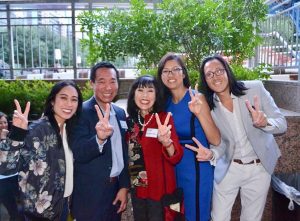
Texas Bar Asian Pacific Interest Section Members hanging out with Karen Korematsu (center), Keynote Speaker 23rd Annual APIS Conference
“If I told you that a flower bloomed in a dark room, would you trust it?” — Kendrick Lamar
On Wednesday, January 30, California celebrated Fred Korematsu Day. Two years ago, for his 98th birthday, Google honored the late Korematsu with a Google Doodle.

The Law Firm’s Guide To Trust Accounting And Three-Way Reconciliation
Proper trust accounting and three-way reconciliation are essential for protecting client funds and avoiding serious compliance risks. In this guide, we break down these critical processes and show how legal-specific software can help your firm stay accurate, efficient, and audit-ready.
In its tribute, Google stated:
Today Google’s US homepage is celebrating Fred Toyosaburo Korematsu, civil rights activist and survivor of the internment of Japanese Americans during World War II. January 30th, 2017 would have been his 98th birthday and is officially recognized as Fred Korematsu Day in California, Hawaii, Virginia and Florida….
The doodle by artist Sophie Diao–herself a child of Asian immigrants–features a patriotic portrait of Korematsu wearing his Presidential Medal of Freedom, a scene of the internment camps to his back, surrounded by cherry blossoms, flowers that have come to be symbols of peace and friendship between the US and Japan.
As a minority attorney, it is my hope that more states, especially the states where I have spent considerable time, Michigan and Texas, will one day honor the late Korematsu. It is so important for our culture and society to remember the legacies we have all inherited.
Since the election, a few members of Donald Trump’s administration, such as Kansas Secretary of State Kris Kobach, have publicly floated the idea of reinstating a registry for immigrants. Some proponents have cited the registry for Japanese-Americans during World War II as a precedent for targeted, profiling registries. These registries were a tool in removing Japanese-Americans from “designated military areas” and forcing them into internment camps or deporting them.

Why Law Firms Are Moving Beyond The Billable Hour
Explore 5 expert-backed reasons law firms are rethinking the billable hour and how legal billing software is leading the way.
As a past member of the 30th Congressional District Asian Advisory Committee, I had asked Rep. Eddie Bernice Johnson for support in requesting that Texas honor the late Fred Korematsu, a Japanese-American who refused to report to an internment camp.
In 1942, at the age of 23, Korematsu chose to violate President Franklin D. Roosevelt’s Executive Order 9066, which authorized all individuals of Japanese ancestry to be removed from designated “military areas” and placed in internment camps. For his resistance, Korematsu was labeled a fugitive.
After he was arrested and convicted of defying the government’s order, Korematsu appealed his case all the way to the Supreme Court. In 1944, the Supreme Court ruled against him, arguing the incarceration was due to military necessity. That, of course, was later debunked.
On Nov. 10, 1983, Korematsu’s conviction was finally overturned. In 1998, he received the Presidential Medal of Freedom, the nation’s highest civilian honor. In 2010, California passed the Fred Korematsu Day bill, making Jan. 30 the first day the U.S. named after an Asian American, according to the Fred T. Korematsu Institute. Several other states now also honor the late Fred Korematsu on Jan. 30, his birthday.
Even though Korematsu effectively became a prisoner of war under the color of rule of law for simply having Japanese heritage, he remained loyal to our country and our Constitution.
In 1998, former President Bill Clinton awarded Korematsu the Presidential Medal of Freedom — the nation’s highest civilian honor — for his unwavering loyalty to our country, unlawful detention by our country, and active civic engagement in our country.
As highlighted by his institute, Korematsu’s legacy continues to inspire people of all backgrounds and demonstrates the importance of speaking up to fight injustice. It is important to remember that the constitutionality of Executive Order 9066, which ordered Japanese-Americans into internment camps regardless of citizenship, has still not officially been overruled by our courts. We know if the issue should ever arise again, some will claim precedent over dicta when staking their claims.
Over the last decade, the Asian-American population in Texas has more than doubled, according to the Texas Office of the State Demographer. Yet, there remains no day in Texas, and many other states, named after an Asian American.
Along with his courage and sacrifices, Fred Korematsu should be honored nationally for his contribution to our country’s history of civil rights.
Renwei Chung is the Diversity Columnist at Above the Law. You can contact Renwei by email at [email protected], follow him on Twitter (@renweichung), or connect with him on LinkedIn.